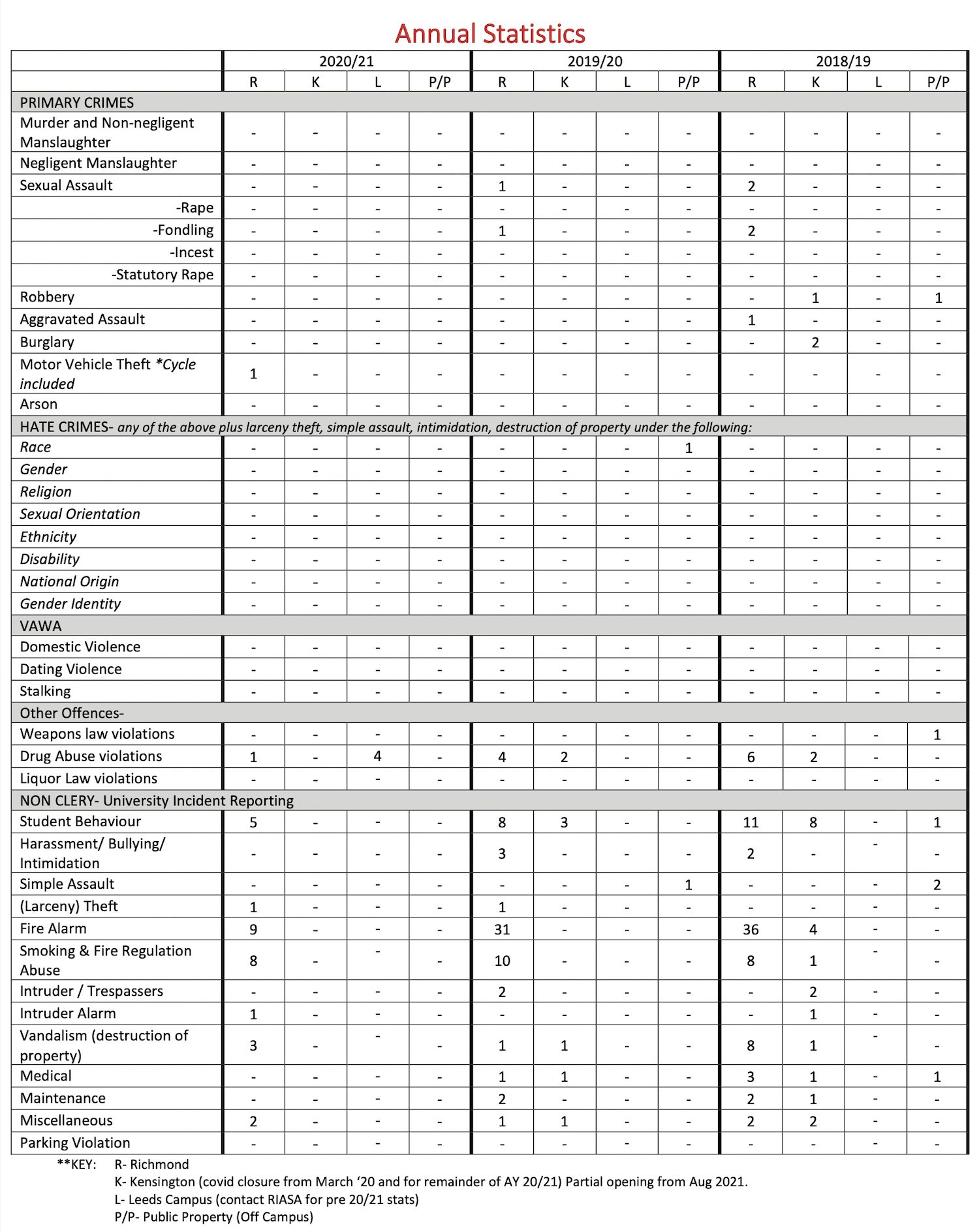Safety & Security
Vice President for Student Affairs on Public Safety:
Dear Students,
First, let me reassure you that your safety and security is Richmond’s priority. Living in a capital city like London offers wonderful opportunities, but also at times some risks, and we keep security on our London campus and facility under constant review. The University works closely with the local police and other agencies and pays specific attention to terrorism and related risks. We have received no indication of an increased risk at this time.
Regardless, we believe vigilance in staying safe is always important, so please take a few moments to read through our suggestions on how to keep safe.
- While you are on campus, please wear your ID visibly at all times. This allows staff to easily identify you and easily shows who is a visitor. If you are asked to show your ID, please comply with the request. This is for YOUR safety.
- If you plan on hosting a visitor on campus, please follow our policies. All guests must check in through our security offices and should wear visible ID at all times.
- Until further information about the incident becomes available, avoid crowded squares and public areas where people gather. Always report suspicious behaviour to a police officer. The emergency number in the UK is 999. Our security offices on campus can be reach by dialing 020 8332 8230.
- If you are a US citizen, you can register with the US State Department Smart Traveller Enrollment Programme here. This programme identifies US citizens travelling abroad and alerts them to possible dangers. Should you lose your passport or run into other difficulties, support will be expedited if you are registered with STEP.UK and EU citizens may wish to consult the .gov.uk website. Latest travel advice by country including safety and security, entry requirements, travel warnings and health.Students from other countries should check with their local embassies about travel alerts to stay abreast of events.
- If you plan to travel outside of London, please alert staff in the Student Affairs office and let your peers know. It is always better to travel with friends than to travel alone. Stay in contact with family back home and let them know where you are going and when you will be returning.
- Don’t be afraid to alert a staff member to someone or something that appears suspicious or unusual. Most crimes are crimes of opportunity, but if there is no opportunity, there can be no crime!
- If you feel unsafe, concerned or worried, please let us know. We’re here to help!
Best Wishes,
Dr Allison Cole-Stutz
Vice President for Student Affairs/Dean of Students
studentaffairs@richmond.ac.uk
University Safety and Security Guidance: Academic Progress, Attendance and Withdrawal
Richmond American University London, takes appropriate and reasonable steps to ensure the safety of its students and to ensure they are not victims of criminal acts, including acts of terror. The University works with the local police and other authorities, and monitors relevant advisory notices from the UK, US and other EU governments, and is guided by the advice and information they provide.
It is the policy of the University that provided the London campus and facility and the Leeds programme are able to operate normally, the University applies its standard rules to any student requesting a withdrawal (provided in the University Catalogue) and does not allow special arrangements because of any non-specific or general concern about terrorism or other forms of criminal activity. Exceptions are allowed on a case-by-case basis but only where a student has a documented condition which may be exacerbated stress or anxiety.
Should the University be made aware of any specific safety issues related to London or Leeds it will take prompt action and will inform staff and students accordingly, and produce appropriate advice and guidance on the completion of classes, the award of credit, and related matters.
Student Code of Conduct
Violations of the Rights of Others (extract from the Student Code of Conduct)
Physical Abuse:
Physical abuse or injury to oneself or others. These acts include, but are not limited to, assault, battery, personal abuse, and non-consensual sexual acts. Acts of physical abuse and violence may result in suspension, expulsion or residence hall removal.
Harassment/Intimidation:
Harassment, threats, intimidation, coercion, or use of physical force, or the threat of physical force, in a manner which causes another person to be reasonably apprehensive or endangers the health or safety of another person. No student shall engage in conduct that limits or restricts the freedom of a person to move about in a lawful manner without consent. No student will participate in conduct or nuisance actions that may prevent or distract other students from their University studies or legitimate pursuit of their personal affairs. No student shall use a telephone, computer, or other electronic media to carry out any harassing offences.
Instigation:
Requesting, encouraging, initiating, or assisting another person to commit any act which would violate this Code, or University, local, or federal laws, regulations or ordinances.
Discrimination Based Violations:
The commission of any offence that is motivated by the race, gender, colour, religion, national origin, cultural background, disability, or sexual orientation of another individual or group of individuals.
Alcoholic Beverages:
The consumption, distribution and/or abuse of alcoholic beverages in common areas on University property except in specific cases which are clearly defined and authorized is in violation of this section. Common areas include but are not limited to corridors and common rooms. Students may drink in moderation in their own rooms in such a way that does not adversely affect others. Alcohol must be transported to student rooms in closed, sealed containers.
The legal age for alcohol in Great Britain is 18 years of age. Students of this age are allowed to drink on this basis. But again, the University does not condone the effects of excessive alcohol use.
Illegal Drugs/Controlled Substances:
The use, consumption, possession, sale, distribution or abuse of illegal drugs or controlled substances or drug paraphernalia, including the sale of prescription drugs is in violation of this section. The University enforces a strict drug policy in conjunction with British Law which prohibits both the recreational use and supply of any illegal drugs ranging from cannabis to harder substances such as cocaine and heroin. Residence Life staff and Security will respond to any indication of use or possession of illegal substances and are authorised to carry out room searches where such activity is suspected or where the health or safety of the resident(s), other persons or property seem threatened. Students who are present in the immediate environs where such materials are used or found, may also be presumed to be in possession and may be charged with possession of those materials, but may rebut the presumption by clear evidence. The presumption of possession is highest when drugs are found in a student’s room, even if the room is shared with roommates. Incidents of drug use may result in suspension or expulsion from the University.
Emergency Procedures:
Failure to evacuate University buildings during all fire alarms and emergency evacuations of any kind according to established procedures violate this section. Tampering with emergency and/or safety equipment, falsely reporting a fire, activating emergency warning equipment, or communicating false information regarding the existence of explosives on University property are also in violation of the Student Code of Conduct. Students will be in violation of this section for failure to obey all reasonable directives from authorised University personnel during a fire drill or other emergency procedures.
Disorderly Conduct:
Acts against public order and decency including, but not limited to, criminal mischief, trespassing, fighting, unreasonable noise, public intoxication resulting from the use of alcohol or controlled substances, lewd or indecent conduct, a breach of the peace, or aiding, abetting, and/or procuring another to do the same, and all other acts of disruption or disturbance is also a violation of this section.
Weapons:
Possession, transportation, improper storage, use, or manufacture of firearms, fire crackers, guns, knives, explosives, weapons, or any item which is intended to be used as a weapon or has been modified or adapted so that it can be used as a weapon is in violation of this section.
Violations of UK Law:
The University recognizes UK Law as the law of the land and will follow the law and sanctions made to violators without reservation. Students found guilty of violating UK law risk expulsion and deportation (where applicable) as well as prosecution by the UK justice system.
Hazing:
Student organizations are prohibited from hazing applicants for membership and from hazing persons who are already members to maintain their memberships in organisations. The University also prohibits such activities and violations, which will be adjudicated under this section. Any organisation found to have engaged in hazing may have its official recognition permanently revoked. Any student who participates in hazing may be fined, suspended or expelled from the University. Persons who may be found in violation of hazing can include those who implement or initiate hazing, anyone in a leadership role in the chapter or organisation, any new member who wilfully participates in hazing activities during new member education, and/or any other victims agreeing to the hazing.
The following provides a definition and description of hazing:
An organization and its members are engaged in hazing if it engages, for purpose of initiation or continuing membership, in an action which recklessly or intentionally endangers the physical or mental health of a student. This means any potentially dangerous forced activity; any activity which could cause a student to suffer extreme mental stress; as well as any other form of forced activity potentially harmful to the mental health or dignity of a student.
An organization and its student members are also engaged in hazing if potential or current members engage in activities that cause the wilful destruction or removal of public or private property.
Crime Statistics
The Student Right-to-Know and Campus Security Act of 1990 require colleges and universities to publish reported Campus Crimes and Arrest Statistics annually.
RAIUL complies with all laws pertaining to the reporting of crime and the right to information. The following statistics reported in compliance with the Campus Security Act of 1990 are provided for your information and reflect on campus incidents and off campus (P/P) reported incidents involving students
Crime Statistics Table



